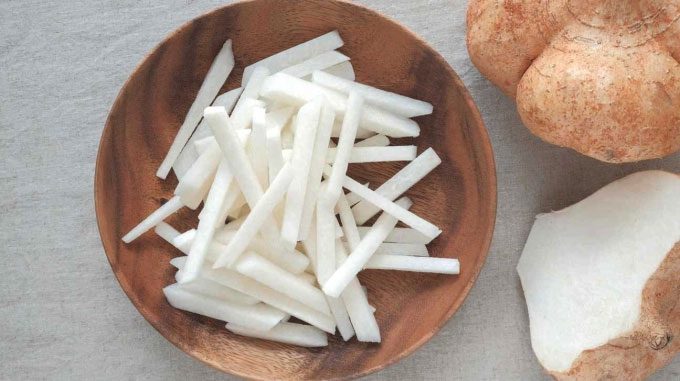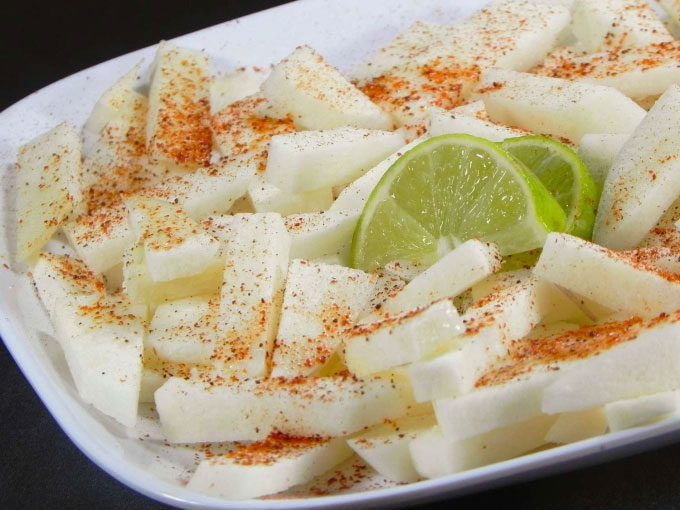This root vegetable is not only a “medicine” for boosting immunity during seasonal changes but also helps regulate blood sugar and prevent colorectal cancer.
Surprising Benefits of Jicama You Should Know
Jicama is a root vegetable familiar to the people of Vietnam, available in various stores and markets at very low prices. It is commonly used as a snack or in dishes like salads, stir-fries, and stews. Compared to other fruits, jicama has a milder taste, which leads some people to dislike it.
However, in terms of nutritional value and health benefits, jicama is by no means inferior to other vegetables and fruits.

Jicama. (Image: ST).
Nutritional Value of Jicama
According to the Cleveland Clinic (a leading healthcare system in the U.S.), 130g of fresh jicama contains: 49 calories; 12g carbohydrates; 0g cholesterol; 0.1g fat; 6.4g fiber; 1g protein; 5mg sodium; 2.3g sugar.
In terms of nutritional composition, jicama is surprisingly rich in vitamin C, containing up to 26.3mg (44% of the daily value – DV); 195mg potassium (6% DV); 15.6mcg folate (4% DV); 0.78mg iron (4% DV); 15.6mg magnesium (4% DV); 16mg calcium (1% DV).
Health Benefits of Jicama
Not only is jicama nutritious, but it also has numerous health benefits, including:
Fiber Supplementation and Weight Loss
Jicama is an excellent source of fiber and water for the body, with 90% of its weight being water. According to Julia Zumpano, a nutrition expert, these two characteristics of jicama can prevent constipation and help the digestive system function more smoothly.
Since fiber takes longer to digest, consuming jicama can increase feelings of fullness and aid in weight loss.
Jicama has a pleasant crunchy texture when bitten into, making it a popular snack. Mia Syn, a dietitian in the U.S., notes that it is a low-calorie snack. She explains, “Jicama is low in calories and high in water, making it a great choice for those looking to manage their weight. A cup of raw jicama has less than 50 calories.”
Nourishing the Gut Microbiome
Jicama contains a significant amount of inulin, a type of indigestible fiber that nourishes beneficial bacteria in the digestive system. A review indicates that inulin helps enhance gut microbiome health, which aids in digestion and nutrient absorption.
Inulin in jicama is particularly beneficial for individuals with digestive disorders. Numerous studies have shown that a healthy digestive system not only improves physical health but also benefits mental well-being.
Rich in Antioxidants, Boosts Immunity, Prevents Diseases
Vitamin C is an effective remedy against the common cold and other viruses, known for its role as an antioxidant in supporting a healthy immune system. Citrus fruits and their juices are rich sources of vitamin C, and jicama falls into this category as well.
A 130g serving of jicama provides over 26mg of vitamin C, nearly half the recommended daily intake. Additionally, jicama offers vitamins A and E, as well as selenium—all antioxidants that protect the body from free radicals.
Free radicals are unstable molecules that can cause chronic inflammation and contribute to conditions like diabetes, cardiovascular diseases, Alzheimer’s, and many other health issues.
Antioxidants also enhance immune health, helping the body fend off pathogens such as viruses, bacteria, and infections.

Jicama is a healthy snack. (Image: ST).
Stabilizes Blood Sugar
Jicama is low in sugar but high in fiber, resulting in a low glycemic index. Therefore, jicama is a healthy choice for people with diabetes or those monitoring their blood sugar levels.
Nutrition expert Zumpano explains, “Fiber slows the absorption of sugar into the bloodstream, helping stabilize blood sugar levels. Consuming high-fiber foods prevents erratic spikes or drops in blood sugar.”
Improves Blood Flow
The fiber content in jicama helps lower cholesterol, preventing artery blockages and promoting heart health. Additionally, the potassium in jicama helps regulate blood pressure and relax blood vessels, ultimately improving blood flow to and from the heart, thereby protecting heart health.
Reduces the Risk of Colorectal Cancer
A comprehensive analysis published in 2018 in the Journal of Nutrition highlighted the role of fiber in reducing the risk of colorectal cancer. Increasing fiber intake in the diet has been shown to help prevent this type of cancer.
Jicama is high in fiber, especially “gut-friendly” fibers.
May Support a Healthy Heart
According to the World Health Organization (WHO), heart disease is the leading cause of death in most countries worldwide. Two of the main factors contributing to heart disease are high cholesterol and high blood pressure.
Roney shares that one way to support heart health is by consuming plenty of fiber- and antioxidant-rich foods like jicama. She explains, “The fiber in jicama can support heart health by reducing total and ‘bad’ LDL cholesterol. According to a review, jicama has also been shown to lower blood pressure, while a diet rich in antioxidants may reduce the risk of cardiovascular diseases.”
Tips for Eating Jicama
According to WebMD, only the flesh of this vegetable is safe to eat. The skin, stem, leaves, and seeds are toxic. Some people allergic to jicama may experience skin reactions and itching in the throat, mouth, and lips shortly after consumption.



















































